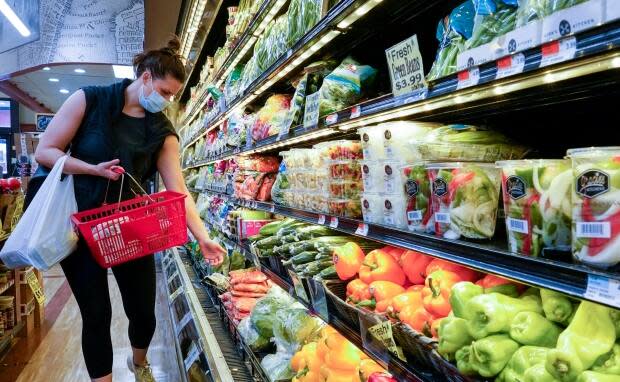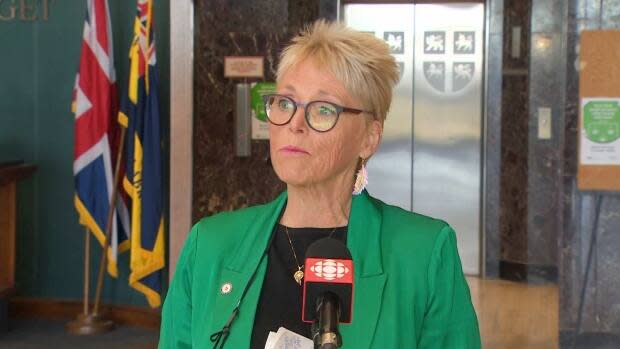Workers, business owners in N.L. still looking for a light at the end of the pandemic tunnel


It's no secret the COVID-19 pandemic has been devastating for workers and business owners alike, but as the Omicron wave continues to infect hundreds of new cases per day in Newfoundland and Labrador, advocates say more robust supports are needed for both.
Over two episodes last week, CBC's CrossTalk looked at the challenges employees and employers are facing.
Alyse Stuart is the chair of Common Front Newfoundland and Labrador, a group behind a new labour action initiative called the Workers Action Network, which she said will advocate for employees across the province.
"What every person wants in every facet of their life is to feel protected, to feel like they are secure, and that they enjoy what they're doing," she said.
Common Front Newfoundland and Labrador is the group behind the Fight for 15 and Fairness, a campaign petitioning the provincial government to raise the minimum wage to $15. Newfoundland and Labrador's minimum wage is $12.75, the fourth lowest in Canada.
"Having a higher minimum wage, a livable minimum wage, is a big concern for us and we've been advocating for that for a long time," said Mary Shortall, president of the Newfoundland and Labrador Federation of Labour.
Shortall said about 50,000 workers in Newfoundland and Labrador make $15 an hour or less.

But a higher minimum wage is just one change that would benefit low income workers in the province, she said, pointing to recent calls for legislated paid sick days for workers as another example.
"Very low-income workers who are having a hard time making ends meet now have to make the choice of feeding their families or going to work when they're sick," she said. "If they go to work sick, we know what happens."
Newfoundland and Labrador requires employers to provide seven days of unpaid sick days but does not mandate any paid sick days, despite the isolation requirement for anyone who contracts COVID-19.
Hard on gig workers
Chris Andrews, lead singer of Newfoundland folk band Shanneyganock, emphasized the impact of the lockdowns on performers and other gig workers.
"It was a dream killer for many," he said. "I feel for everybody."
Performance spaces in Newfoundland and Labrador are closed under Alert Level 4, so performers and those who work behind the scenes are out of a job, for now. Andrews said cancellations have a ripple effect.
"It's affecting everybody, right from the venues, to all the sound guys, light people and security."
Shanneyganock was forced to cancel some shows over the holidays when cases first began to climb. Andrews said the band has worked on some virtual performances, but they don't have the same impact as live shows.
"You just got to try to ride it out. Hopefully, when things do come back, it will be similar to what we left," he said.
Challenges for businesses
Meanwhile, Newfoundland and Labrador business owners are navigating shifting capacity and safety regulations and a strained workforce.
Richard Alexander, the executive director of the Newfoundland and Labrador Employers' Council, said there are high levels of anxiety, depression and fear among business owners and managers.

"There's a whole multitude of challenges that businesses are dealing with now," he said, including balancing employee and customer safety while making up lost revenue.
Christiana and Sunday Emmanuel opened Afro Kitchen N.L., a St. John's African restaurant last February, and though it has been difficult at times, they say their food has proved popular.
"People will always eat. Everybody will always eat," said Sunday.

However, Sunday said the Omicron wave has caused new hardship. He said they are now short on workers for the kitchen, which means they have to prepare the food themselves.
"Some fear they have been exposed, others just don't want to get exposed," he said. "The demand for food is still there. It's not dropping, but the workforce is dropping."
Additional stresses
Alexander said the situation at Afro Kitchen is becoming common at restaurants across the province.
"You're seeing a lot of the owners or managers or whatever are doing things in the kitchen, doing things that they wouldn't normally do, yet trying to have to do all the things that they would do in their in their regular day to day work."
Sandy Bennett is the owner of EmpowHer Fitness, a women's fitness studio.
Though gyms are allowed to remain open, exercise classes must operate at a maximum of 25 per cent capacity. Bennett said she's decided to operate at an even lower physically distanced capacity for safety.
"I'm worried about the finances, I'm worried about my members' health, I'm worried about my members' mental health," she said.
Bennett said she's breaking even, but if her business is shut down again after the Omicron wave, she doesn't know if she'll be able to take it.
"You kind of lose a little piece of yourself every time you shut down, so it's kind of hard to crawl back out again."


